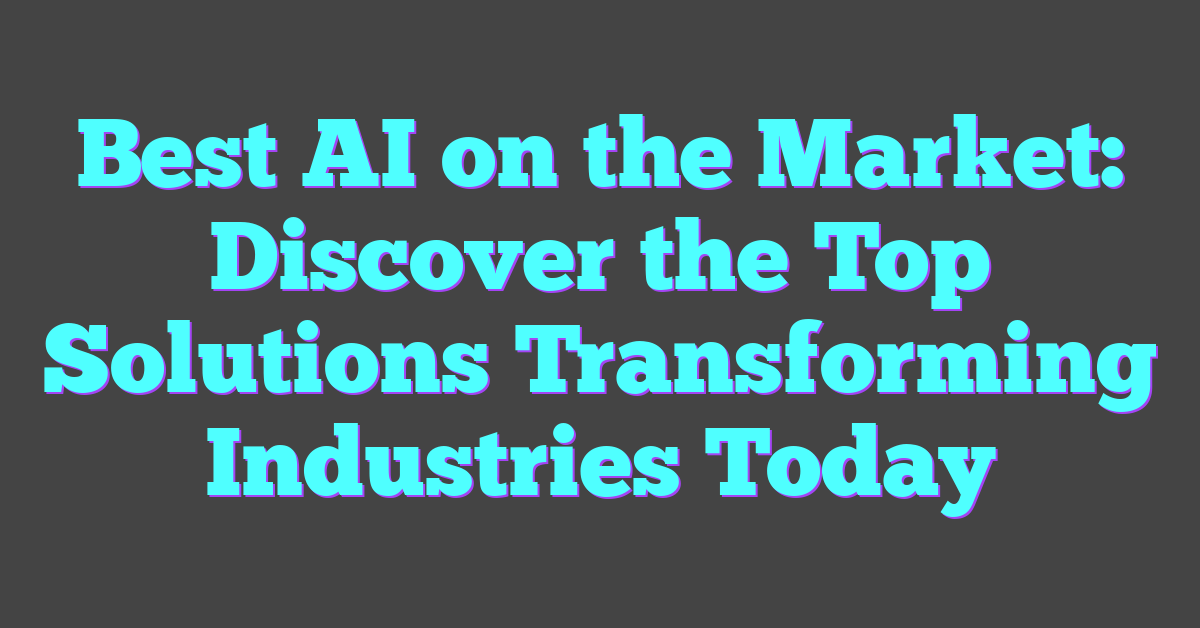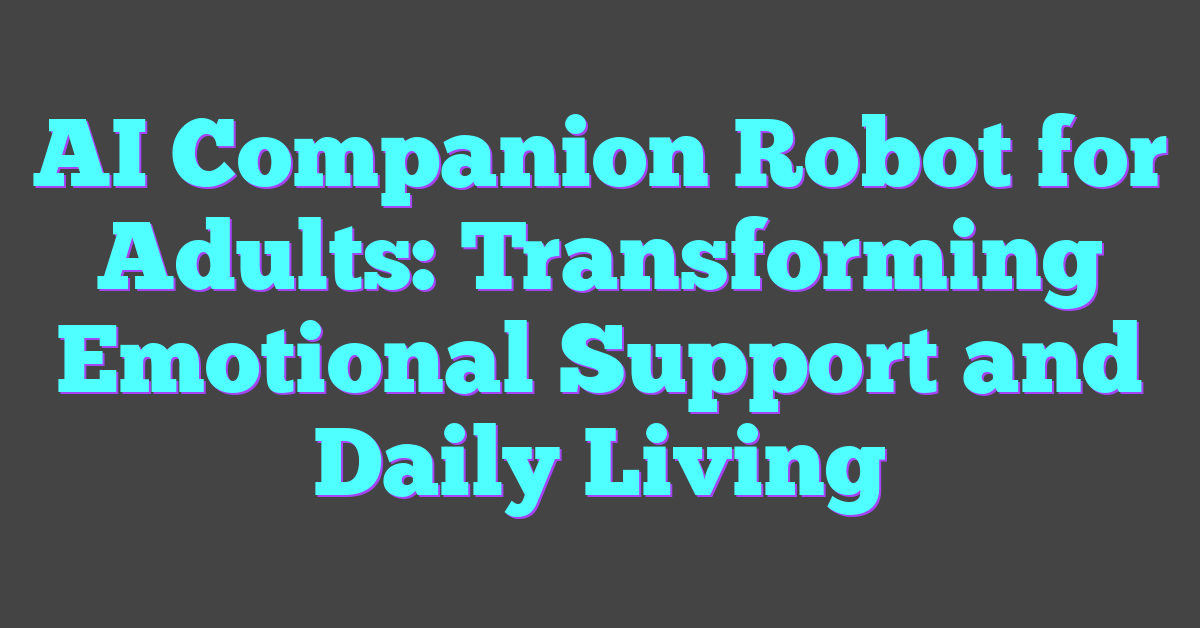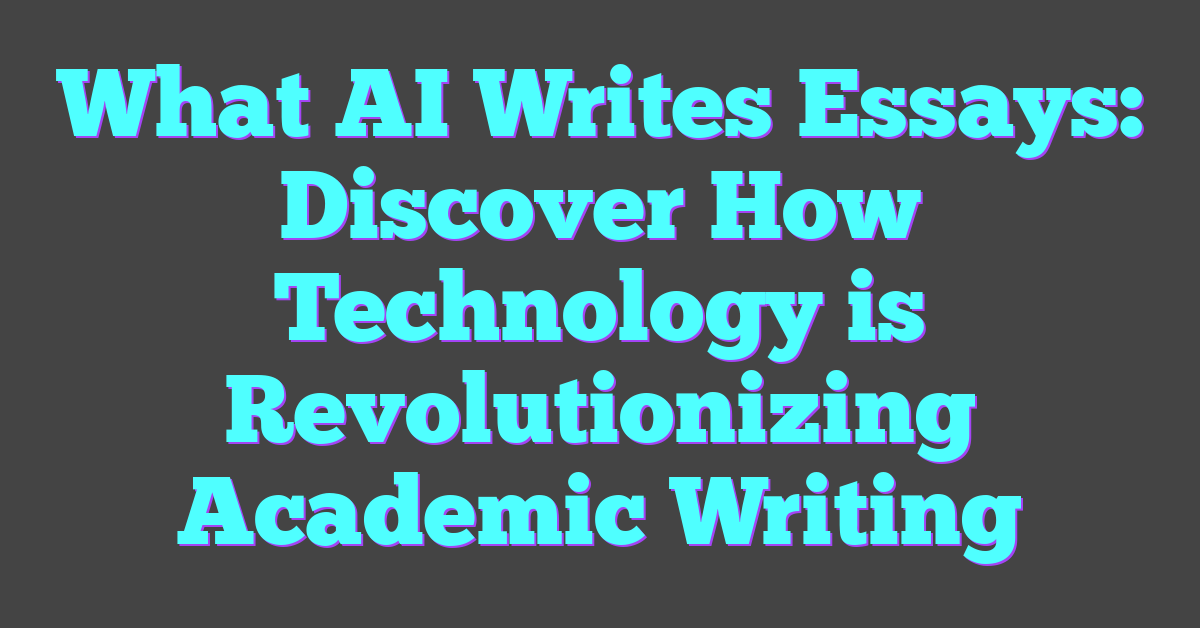Artificial intelligence isn’t just a buzzword anymore; it’s revolutionizing industries from healthcare to finance. With the rapid advancements in AI technology, choosing the best AI on the market can feel overwhelming. Whether you’re a business owner looking to streamline operations or a tech enthusiast eager to explore new possibilities, understanding the top AI options is crucial.
Understanding the Landscape of AI Technology
The landscape of AI technology is vast and constantly evolving. Becoming knowledgeable about its core features and historical context helps in making informed choices.
Key Features to Consider
Several key features distinguish top AI technologies:

- Scalability: A scalable AI system adapts to increasing data loads without compromising performance. Example – Cloud-based AI services.
- Accuracy: High accuracy in data interpretation and outcomes reduces errors. Example – Predictive analytics in healthcare.
- Speed: Faster AI algorithms deliver results in real-time. Example – Real-time fraud detection in finance.
- Learning Capabilities: Robust learning capabilities enable AI to improve over time through exposure to more data. Example – Personalized recommendations in e-commerce.
- Ease of Integration: Seamless integration with existing systems enhances utility. Example – AI chatbots integrated into customer service platforms.
Evolution of AI Over the Years
AI technology has experienced significant development:
- 1950s-1960s: Early AI research focused on symbolic systems and problem-solving. Example – Logic Theorist by Newell and Simon.
- 1970s-1980s: Introduction of machine learning and neural networks began shaping modern AI. Example – Backpropagation in neural networks.
- 1990s-2000s: Expansion of data availability and computational power led to advancements in AI capabilities. Example – IBM’s Deep Blue defeating chess champion Garry Kasparov.
- 2010s-Present: AI surged with deep learning and natural language processing innovations. Example – GPT-3 by OpenAI demonstrating human-like text generation.
These features and historical milestones highlight how AI technologies continually advance, reshaping their influence on various sectors.
Top AI Solutions Currently on the Market
Several AI solutions dominate today’s market, each offering unique capabilities across various industries. Below, the focus will pinpoint how AI impacts healthcare, finance, and customer service.
AI in Healthcare
AI revolutionizes healthcare with advanced diagnostics and predictive analytics. IBM Watson Health, an AI system, enables better patient outcomes by analyzing medical data swiftly. PathAI uses machine learning to improve the accuracy of pathology diagnoses, aiding doctors in making more informed decisions. Another notable example, Aidoc, leverages AI to identify critical findings in medical images, reducing diagnostic times and improving patient care.
AI in Finance
Financial institutions leverage AI to enhance security, optimize trading, and improve customer experiences. JPMorgan’s COiN platform uses machine learning algorithms to analyze legal documents, significantly reducing the time required for review. Meanwhile, AlphaSense employs AI to provide financial analysts with insights through natural language processing (NLP) capabilities. Additionally, Darktrace uses AI to detect and respond to cyber threats in real-time, protecting financial assets from potential breaches.
AI in Customer Service
In customer service, AI-powered solutions improve efficiency and customer satisfaction. Zendesk’s Answer Bot, for instance, uses machine learning to provide automated responses to common inquiries, freeing up human agents for more complex tasks. LivePerson utilizes AI to facilitate intelligent customer interactions across various communication channels, enabling personalized experiences. Another key player, Ultimate.ai, offers a robust platform for automating customer support, resulting in faster resolution times and enhanced service quality.
| AI Solution | Industry | Key Feature |
|---|---|---|
| IBM Watson Health | Healthcare | Advanced diagnostics via data analytics |
| PathAI | Healthcare | Accurate pathology diagnoses with machine learning |
| Aidoc | Healthcare | Quick identification of critical findings in images |
| COiN by JPMorgan | Finance | Legal document analysis with machine learning |
| AlphaSense | Finance | Insights through NLP |
| Darktrace | Finance | Real-time cyber threat detection and response |
| Zendesk’s Answer Bot | Customer Service | Automated responses to common inquiries |
| LivePerson | Customer Service | Intelligent customer interactions |
| Ultimate.ai | Customer Service | Automated customer support |
These AI solutions showcase the diverse applications and transformative potential of artificial intelligence across key industries.
Criteria for Evaluating AI Technology
Selecting the best AI technology requires a thorough evaluation of multiple criteria. Precision, usability, and ongoing support are fundamental aspects influencing AI adoption and success.
Accuracy and Reliability
Accuracy measures how closely AI outputs match the ground truth or desired outcomes. Systems such as Natural Language Processing (NLP) models and image recognition software exhibit high accuracy when they effectively identify entities or patterns. Essential factors include data quality, model training processes, and algorithm robustness. Reliable AI maintains consistency across varied applications without degradation in performance. For instance, Google’s BERT model excels in understanding context in search queries, ensuring consistent performance across diverse datasets.
Integration Capabilities
Effective AI integrates smoothly within existing systems, minimizing disruptions. Compatibility with various platforms, from enterprise software like SAP to customer relationship management (CRM) tools such as Salesforce, is crucial. APIs (Application Programming Interfaces) often facilitate seamless integration. Rapid deployment and ease of integration reduce operational downtime and costs. Microsoft’s Azure Cognitive Services exemplifies strong integration capabilities, allowing businesses to embed intelligent features into their applications effortlessly.
Support and Updates
Continuous support and regular updates are vital for maintaining optimal AI performance. Reputable providers offer extensive documentation and customer service. Regular updates ensure the AI remains secure and efficient, adapting to evolving technologies and datasets. TensorFlow, backed by Google, frequently releases updates and provides comprehensive community support, ensuring users have access to the latest advancements and troubleshooting resources.
Future Trends in AI Development
AI continues to change industries globally, with promising advancements on the horizon. As technology evolves, several future trends in AI development stand out.
Predictions for the Next Decade
AI experts forecast dramatic shifts in AI technology over the next ten years. Improved natural language processing (NLP) may enable machines to understand, generate, and interact using human language with near-perfect accuracy. Advancements in reinforcement learning could lead to the development of AI systems that learn from their environments autonomously. Enhanced AI ethics frameworks might emerge, addressing biases within AI systems and ensuring fairer interactions.
Additionally, AI-powered healthcare diagnostics may become more precise, leveraging vast quantities of data to predict and detect diseases earlier. Self-learning algorithms could optimize personalized medicine, leading to better patient outcomes. In finance, AI might predict market trends with improved accuracy, transforming trading strategies and risk management.
Emerging Sectors in AI
Several sectors are witnessing significant AI integration. In the education sector, adaptive learning platforms like DreamBox and Knewton are using AI to offer personalized learning experiences. The agriculture industry is seeing boosts in efficiency and crop management through AI-driven tools like precision farming.
In transportation, AI is powering autonomous vehicles, enhancing public transportation systems, and improving traffic management. Companies like Waymo are at the forefront of developing self-driving technology. Retail is also benefiting, with AI-driven demand forecasting and supply chain optimization helping businesses cater to consumer needs more effectively.
In cybersecurity, AI is identifying and mitigating threats in real-time, ensuring data integrity and security. Solutions like Darktrace use machine learning to detect cyber threats autonomously. AI’s role in these sectors is poised to grow, driving greater efficiencies and innovations.
Conclusion
AI technology has come a long way and continues to evolve at a rapid pace. From revolutionizing healthcare and finance to enhancing customer service, AI’s impact is undeniable. Looking ahead, advancements in natural language processing and reinforcement learning promise to push the boundaries even further.
As AI ethics frameworks develop, they will help ensure responsible and equitable use of these powerful tools. Emerging sectors like education and agriculture are already reaping the benefits, showcasing AI’s potential to drive efficiency and innovation across various industries.
Staying informed about these trends and developments will be crucial for anyone looking to leverage AI’s capabilities effectively. The future of AI is bright and full of possibilities.
Frequently Asked Questions
What is artificial intelligence (AI)?
Artificial intelligence (AI) is a branch of computer science focused on creating systems capable of performing tasks that typically require human intelligence. These tasks include learning, reasoning, problem-solving, understanding natural language, and perception.
How has AI technology evolved over time?
AI technology has evolved significantly since the 1950s, moving from basic problem-solving algorithms to advanced machine learning, neural networks, and deep learning. Key milestones include the development of AI languages, breakthroughs in neural networks, and the rise of deep learning technologies.
What are some key features of AI?
Key features of AI include scalability, speed, learning capabilities, and ease of integration. These features enable AI systems to process large amounts of data quickly, learn from experience, and integrate seamlessly into existing workflows.
Which industries benefit the most from AI?
Industries benefiting the most from AI include healthcare, finance, and customer service. AI solutions such as IBM Watson Health, JPMorgan’s COiN, and Zendesk’s Answer Bot showcase its broad applications and impact.
What are some examples of AI in healthcare?
In healthcare, AI solutions like IBM Watson Health assist with disease diagnosis, personalized treatment plans, and medical research, enhancing the efficiency and accuracy of healthcare delivery.
How is AI used in the finance industry?
In finance, AI-powered solutions like JPMorgan’s COiN automate complex transactions, detect fraud, and analyze large volumes of data efficiently, improving accuracy and reducing costs.
What role does AI play in customer service?
AI plays a significant role in customer service by using tools like Zendesk’s Answer Bot to provide instant responses, automate routine tasks, and improve overall customer satisfaction through efficient service delivery.
What are the future trends in AI development?
Future trends in AI development include advancements in natural language processing, reinforcement learning, and AI ethics frameworks. These trends aim to enhance AI’s capabilities while addressing ethical concerns and ensuring responsible usage.
Which new sectors are emerging as key beneficiaries of AI integration?
Emerging sectors benefiting from AI integration include education, agriculture, transportation, retail, and cybersecurity. AI drives efficiencies and innovations in these areas, transforming traditional methods and improving outcomes.




